Governmental Control Over Population Growth
VerifiedAdded on 2023/06/05
|8
|2180
|412
AI Summary
This essay highlights the reasons why governments should control population growth due to its detrimental effects on the environment, economy, and resources. It sheds light on the factors and damages caused by population growth and the need for sustainability.
Contribute Materials
Your contribution can guide someone’s learning journey. Share your
documents today.
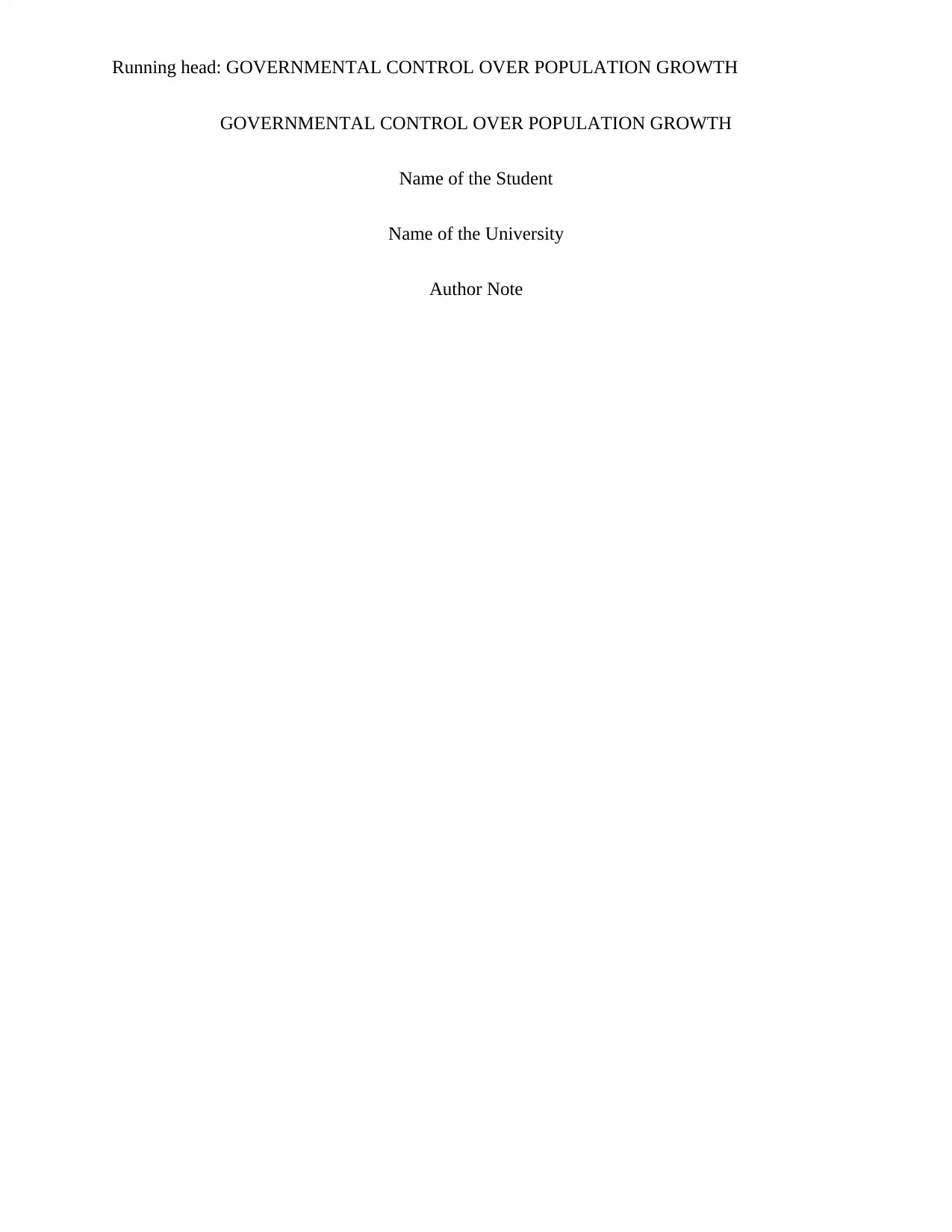
Running head: GOVERNMENTAL CONTROL OVER POPULATION GROWTH
GOVERNMENTAL CONTROL OVER POPULATION GROWTH
Name of the Student
Name of the University
Author Note
GOVERNMENTAL CONTROL OVER POPULATION GROWTH
Name of the Student
Name of the University
Author Note
Secure Best Marks with AI Grader
Need help grading? Try our AI Grader for instant feedback on your assignments.
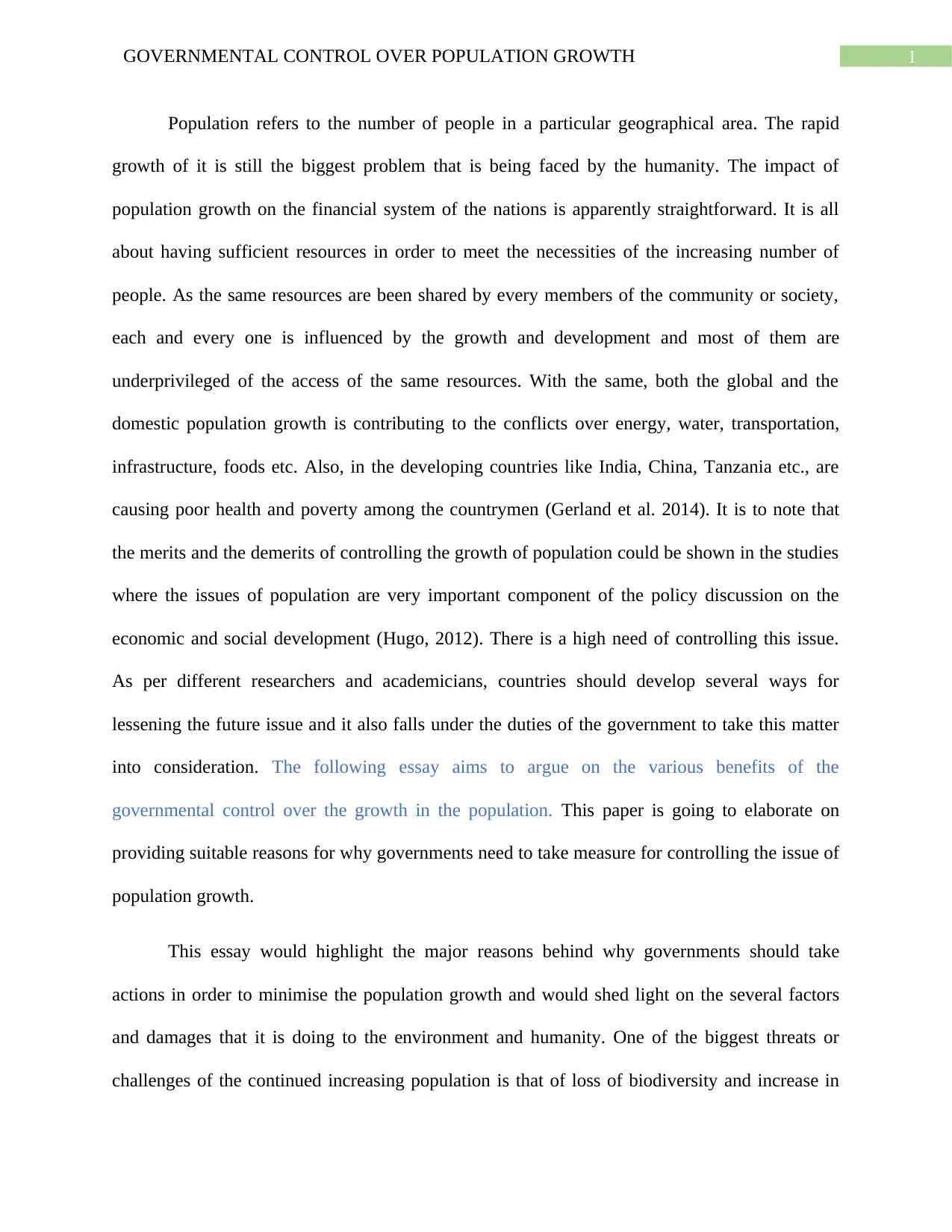
1GOVERNMENTAL CONTROL OVER POPULATION GROWTH
Population refers to the number of people in a particular geographical area. The rapid
growth of it is still the biggest problem that is being faced by the humanity. The impact of
population growth on the financial system of the nations is apparently straightforward. It is all
about having sufficient resources in order to meet the necessities of the increasing number of
people. As the same resources are been shared by every members of the community or society,
each and every one is influenced by the growth and development and most of them are
underprivileged of the access of the same resources. With the same, both the global and the
domestic population growth is contributing to the conflicts over energy, water, transportation,
infrastructure, foods etc. Also, in the developing countries like India, China, Tanzania etc., are
causing poor health and poverty among the countrymen (Gerland et al. 2014). It is to note that
the merits and the demerits of controlling the growth of population could be shown in the studies
where the issues of population are very important component of the policy discussion on the
economic and social development (Hugo, 2012). There is a high need of controlling this issue.
As per different researchers and academicians, countries should develop several ways for
lessening the future issue and it also falls under the duties of the government to take this matter
into consideration. The following essay aims to argue on the various benefits of the
governmental control over the growth in the population. This paper is going to elaborate on
providing suitable reasons for why governments need to take measure for controlling the issue of
population growth.
This essay would highlight the major reasons behind why governments should take
actions in order to minimise the population growth and would shed light on the several factors
and damages that it is doing to the environment and humanity. One of the biggest threats or
challenges of the continued increasing population is that of loss of biodiversity and increase in
Population refers to the number of people in a particular geographical area. The rapid
growth of it is still the biggest problem that is being faced by the humanity. The impact of
population growth on the financial system of the nations is apparently straightforward. It is all
about having sufficient resources in order to meet the necessities of the increasing number of
people. As the same resources are been shared by every members of the community or society,
each and every one is influenced by the growth and development and most of them are
underprivileged of the access of the same resources. With the same, both the global and the
domestic population growth is contributing to the conflicts over energy, water, transportation,
infrastructure, foods etc. Also, in the developing countries like India, China, Tanzania etc., are
causing poor health and poverty among the countrymen (Gerland et al. 2014). It is to note that
the merits and the demerits of controlling the growth of population could be shown in the studies
where the issues of population are very important component of the policy discussion on the
economic and social development (Hugo, 2012). There is a high need of controlling this issue.
As per different researchers and academicians, countries should develop several ways for
lessening the future issue and it also falls under the duties of the government to take this matter
into consideration. The following essay aims to argue on the various benefits of the
governmental control over the growth in the population. This paper is going to elaborate on
providing suitable reasons for why governments need to take measure for controlling the issue of
population growth.
This essay would highlight the major reasons behind why governments should take
actions in order to minimise the population growth and would shed light on the several factors
and damages that it is doing to the environment and humanity. One of the biggest threats or
challenges of the continued increasing population is that of loss of biodiversity and increase in
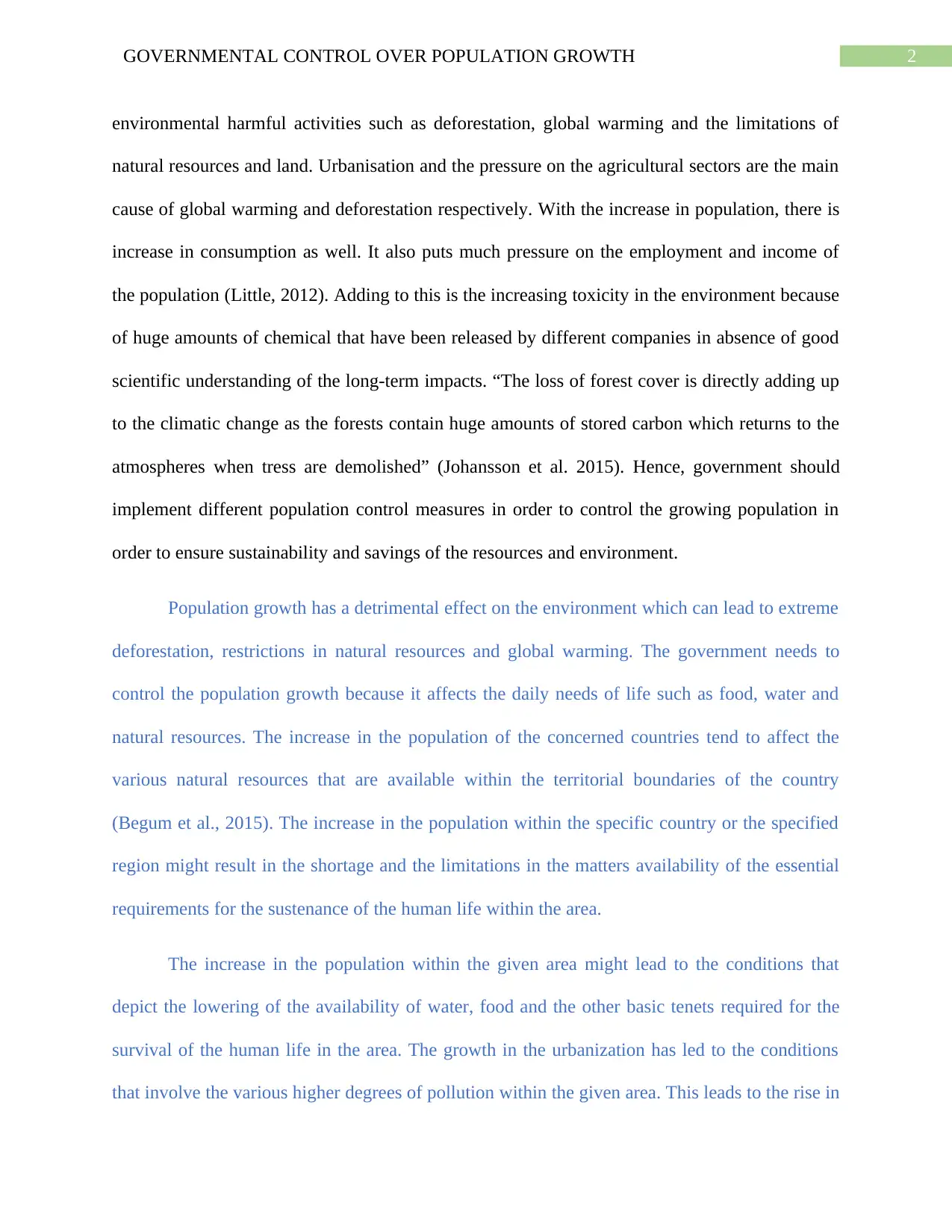
2GOVERNMENTAL CONTROL OVER POPULATION GROWTH
environmental harmful activities such as deforestation, global warming and the limitations of
natural resources and land. Urbanisation and the pressure on the agricultural sectors are the main
cause of global warming and deforestation respectively. With the increase in population, there is
increase in consumption as well. It also puts much pressure on the employment and income of
the population (Little, 2012). Adding to this is the increasing toxicity in the environment because
of huge amounts of chemical that have been released by different companies in absence of good
scientific understanding of the long-term impacts. “The loss of forest cover is directly adding up
to the climatic change as the forests contain huge amounts of stored carbon which returns to the
atmospheres when tress are demolished” (Johansson et al. 2015). Hence, government should
implement different population control measures in order to control the growing population in
order to ensure sustainability and savings of the resources and environment.
Population growth has a detrimental effect on the environment which can lead to extreme
deforestation, restrictions in natural resources and global warming. The government needs to
control the population growth because it affects the daily needs of life such as food, water and
natural resources. The increase in the population of the concerned countries tend to affect the
various natural resources that are available within the territorial boundaries of the country
(Begum et al., 2015). The increase in the population within the specific country or the specified
region might result in the shortage and the limitations in the matters availability of the essential
requirements for the sustenance of the human life within the area.
The increase in the population within the given area might lead to the conditions that
depict the lowering of the availability of water, food and the other basic tenets required for the
survival of the human life in the area. The growth in the urbanization has led to the conditions
that involve the various higher degrees of pollution within the given area. This leads to the rise in
environmental harmful activities such as deforestation, global warming and the limitations of
natural resources and land. Urbanisation and the pressure on the agricultural sectors are the main
cause of global warming and deforestation respectively. With the increase in population, there is
increase in consumption as well. It also puts much pressure on the employment and income of
the population (Little, 2012). Adding to this is the increasing toxicity in the environment because
of huge amounts of chemical that have been released by different companies in absence of good
scientific understanding of the long-term impacts. “The loss of forest cover is directly adding up
to the climatic change as the forests contain huge amounts of stored carbon which returns to the
atmospheres when tress are demolished” (Johansson et al. 2015). Hence, government should
implement different population control measures in order to control the growing population in
order to ensure sustainability and savings of the resources and environment.
Population growth has a detrimental effect on the environment which can lead to extreme
deforestation, restrictions in natural resources and global warming. The government needs to
control the population growth because it affects the daily needs of life such as food, water and
natural resources. The increase in the population of the concerned countries tend to affect the
various natural resources that are available within the territorial boundaries of the country
(Begum et al., 2015). The increase in the population within the specific country or the specified
region might result in the shortage and the limitations in the matters availability of the essential
requirements for the sustenance of the human life within the area.
The increase in the population within the given area might lead to the conditions that
depict the lowering of the availability of water, food and the other basic tenets required for the
survival of the human life in the area. The growth in the urbanization has led to the conditions
that involve the various higher degrees of pollution within the given area. This leads to the rise in
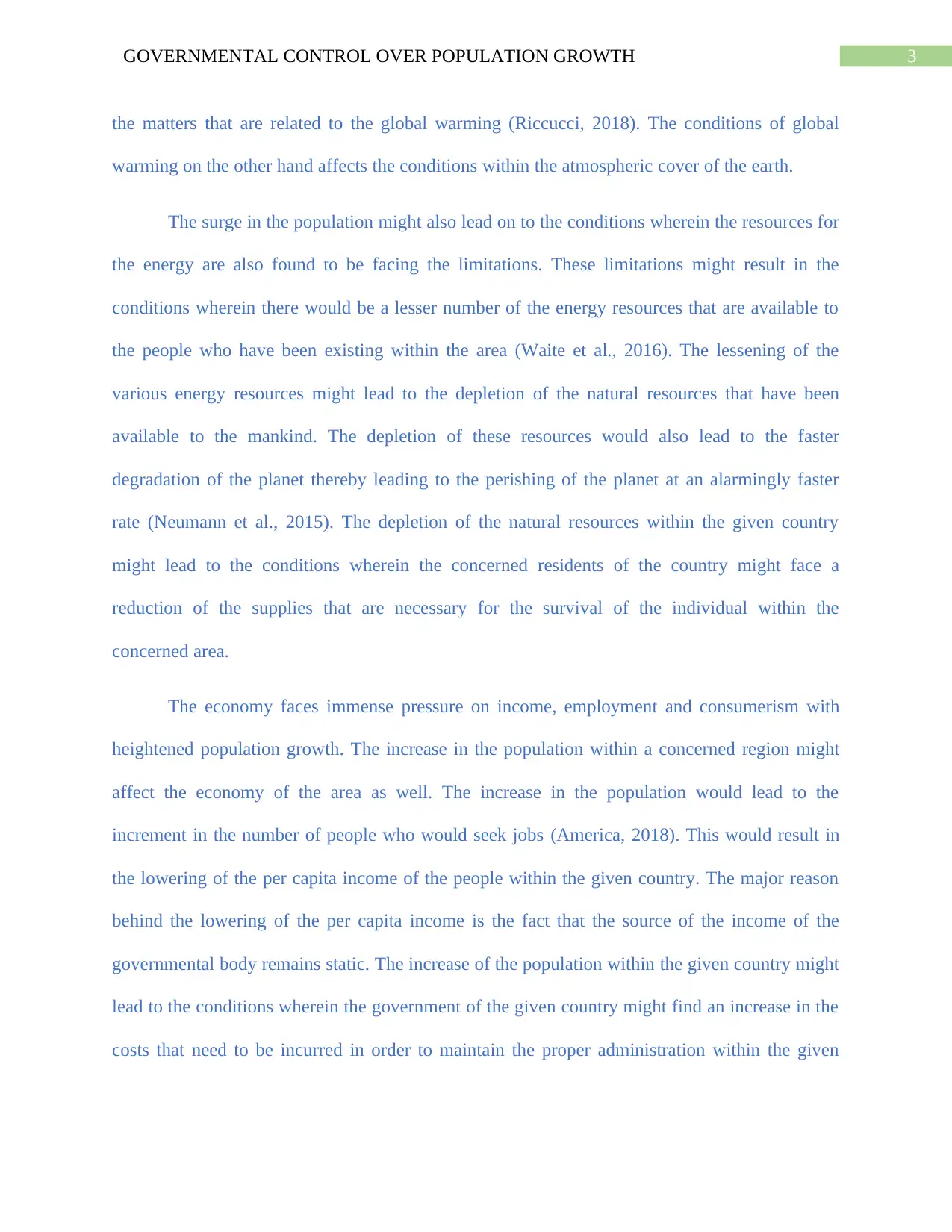
3GOVERNMENTAL CONTROL OVER POPULATION GROWTH
the matters that are related to the global warming (Riccucci, 2018). The conditions of global
warming on the other hand affects the conditions within the atmospheric cover of the earth.
The surge in the population might also lead on to the conditions wherein the resources for
the energy are also found to be facing the limitations. These limitations might result in the
conditions wherein there would be a lesser number of the energy resources that are available to
the people who have been existing within the area (Waite et al., 2016). The lessening of the
various energy resources might lead to the depletion of the natural resources that have been
available to the mankind. The depletion of these resources would also lead to the faster
degradation of the planet thereby leading to the perishing of the planet at an alarmingly faster
rate (Neumann et al., 2015). The depletion of the natural resources within the given country
might lead to the conditions wherein the concerned residents of the country might face a
reduction of the supplies that are necessary for the survival of the individual within the
concerned area.
The economy faces immense pressure on income, employment and consumerism with
heightened population growth. The increase in the population within a concerned region might
affect the economy of the area as well. The increase in the population would lead to the
increment in the number of people who would seek jobs (America, 2018). This would result in
the lowering of the per capita income of the people within the given country. The major reason
behind the lowering of the per capita income is the fact that the source of the income of the
governmental body remains static. The increase of the population within the given country might
lead to the conditions wherein the government of the given country might find an increase in the
costs that need to be incurred in order to maintain the proper administration within the given
the matters that are related to the global warming (Riccucci, 2018). The conditions of global
warming on the other hand affects the conditions within the atmospheric cover of the earth.
The surge in the population might also lead on to the conditions wherein the resources for
the energy are also found to be facing the limitations. These limitations might result in the
conditions wherein there would be a lesser number of the energy resources that are available to
the people who have been existing within the area (Waite et al., 2016). The lessening of the
various energy resources might lead to the depletion of the natural resources that have been
available to the mankind. The depletion of these resources would also lead to the faster
degradation of the planet thereby leading to the perishing of the planet at an alarmingly faster
rate (Neumann et al., 2015). The depletion of the natural resources within the given country
might lead to the conditions wherein the concerned residents of the country might face a
reduction of the supplies that are necessary for the survival of the individual within the
concerned area.
The economy faces immense pressure on income, employment and consumerism with
heightened population growth. The increase in the population within a concerned region might
affect the economy of the area as well. The increase in the population would lead to the
increment in the number of people who would seek jobs (America, 2018). This would result in
the lowering of the per capita income of the people within the given country. The major reason
behind the lowering of the per capita income is the fact that the source of the income of the
governmental body remains static. The increase of the population within the given country might
lead to the conditions wherein the government of the given country might find an increase in the
costs that need to be incurred in order to maintain the proper administration within the given
Secure Best Marks with AI Grader
Need help grading? Try our AI Grader for instant feedback on your assignments.
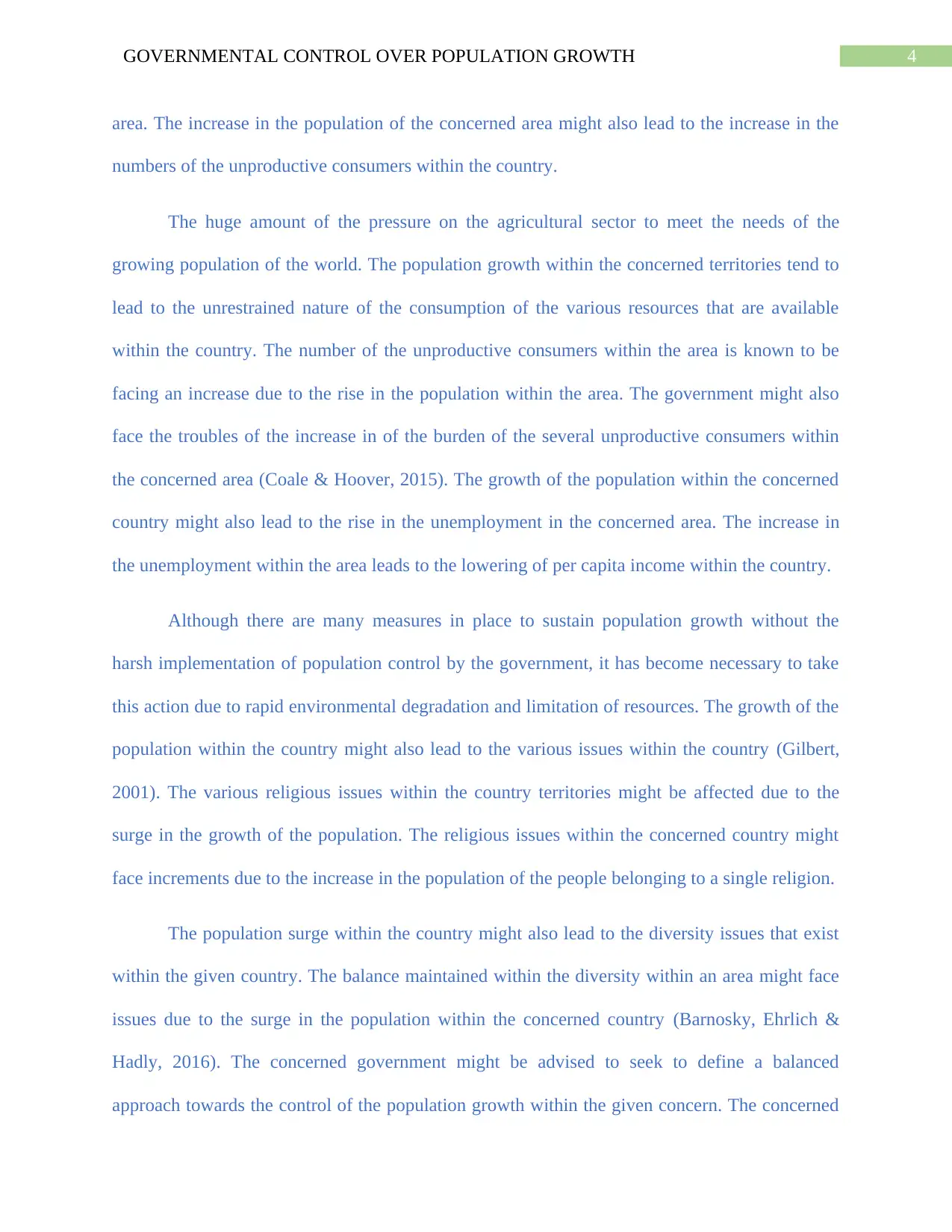
4GOVERNMENTAL CONTROL OVER POPULATION GROWTH
area. The increase in the population of the concerned area might also lead to the increase in the
numbers of the unproductive consumers within the country.
The huge amount of the pressure on the agricultural sector to meet the needs of the
growing population of the world. The population growth within the concerned territories tend to
lead to the unrestrained nature of the consumption of the various resources that are available
within the country. The number of the unproductive consumers within the area is known to be
facing an increase due to the rise in the population within the area. The government might also
face the troubles of the increase in of the burden of the several unproductive consumers within
the concerned area (Coale & Hoover, 2015). The growth of the population within the concerned
country might also lead to the rise in the unemployment in the concerned area. The increase in
the unemployment within the area leads to the lowering of per capita income within the country.
Although there are many measures in place to sustain population growth without the
harsh implementation of population control by the government, it has become necessary to take
this action due to rapid environmental degradation and limitation of resources. The growth of the
population within the country might also lead to the various issues within the country (Gilbert,
2001). The various religious issues within the country territories might be affected due to the
surge in the growth of the population. The religious issues within the concerned country might
face increments due to the increase in the population of the people belonging to a single religion.
The population surge within the country might also lead to the diversity issues that exist
within the given country. The balance maintained within the diversity within an area might face
issues due to the surge in the population within the concerned country (Barnosky, Ehrlich &
Hadly, 2016). The concerned government might be advised to seek to define a balanced
approach towards the control of the population growth within the given concern. The concerned
area. The increase in the population of the concerned area might also lead to the increase in the
numbers of the unproductive consumers within the country.
The huge amount of the pressure on the agricultural sector to meet the needs of the
growing population of the world. The population growth within the concerned territories tend to
lead to the unrestrained nature of the consumption of the various resources that are available
within the country. The number of the unproductive consumers within the area is known to be
facing an increase due to the rise in the population within the area. The government might also
face the troubles of the increase in of the burden of the several unproductive consumers within
the concerned area (Coale & Hoover, 2015). The growth of the population within the concerned
country might also lead to the rise in the unemployment in the concerned area. The increase in
the unemployment within the area leads to the lowering of per capita income within the country.
Although there are many measures in place to sustain population growth without the
harsh implementation of population control by the government, it has become necessary to take
this action due to rapid environmental degradation and limitation of resources. The growth of the
population within the country might also lead to the various issues within the country (Gilbert,
2001). The various religious issues within the country territories might be affected due to the
surge in the growth of the population. The religious issues within the concerned country might
face increments due to the increase in the population of the people belonging to a single religion.
The population surge within the country might also lead to the diversity issues that exist
within the given country. The balance maintained within the diversity within an area might face
issues due to the surge in the population within the concerned country (Barnosky, Ehrlich &
Hadly, 2016). The concerned government might be advised to seek to define a balanced
approach towards the control of the population growth within the given concern. The concerned
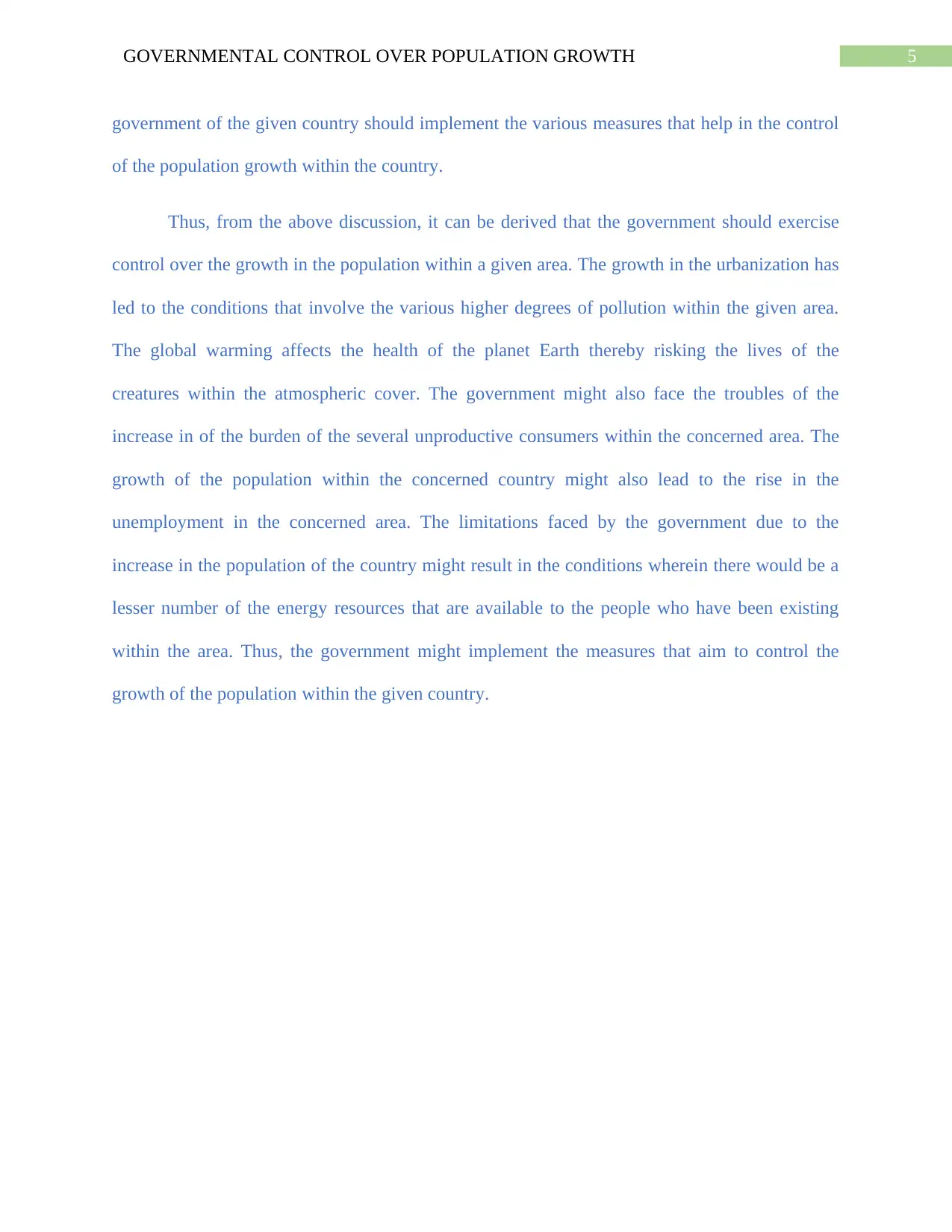
5GOVERNMENTAL CONTROL OVER POPULATION GROWTH
government of the given country should implement the various measures that help in the control
of the population growth within the country.
Thus, from the above discussion, it can be derived that the government should exercise
control over the growth in the population within a given area. The growth in the urbanization has
led to the conditions that involve the various higher degrees of pollution within the given area.
The global warming affects the health of the planet Earth thereby risking the lives of the
creatures within the atmospheric cover. The government might also face the troubles of the
increase in of the burden of the several unproductive consumers within the concerned area. The
growth of the population within the concerned country might also lead to the rise in the
unemployment in the concerned area. The limitations faced by the government due to the
increase in the population of the country might result in the conditions wherein there would be a
lesser number of the energy resources that are available to the people who have been existing
within the area. Thus, the government might implement the measures that aim to control the
growth of the population within the given country.
government of the given country should implement the various measures that help in the control
of the population growth within the country.
Thus, from the above discussion, it can be derived that the government should exercise
control over the growth in the population within a given area. The growth in the urbanization has
led to the conditions that involve the various higher degrees of pollution within the given area.
The global warming affects the health of the planet Earth thereby risking the lives of the
creatures within the atmospheric cover. The government might also face the troubles of the
increase in of the burden of the several unproductive consumers within the concerned area. The
growth of the population within the concerned country might also lead to the rise in the
unemployment in the concerned area. The limitations faced by the government due to the
increase in the population of the country might result in the conditions wherein there would be a
lesser number of the energy resources that are available to the people who have been existing
within the area. Thus, the government might implement the measures that aim to control the
growth of the population within the given country.
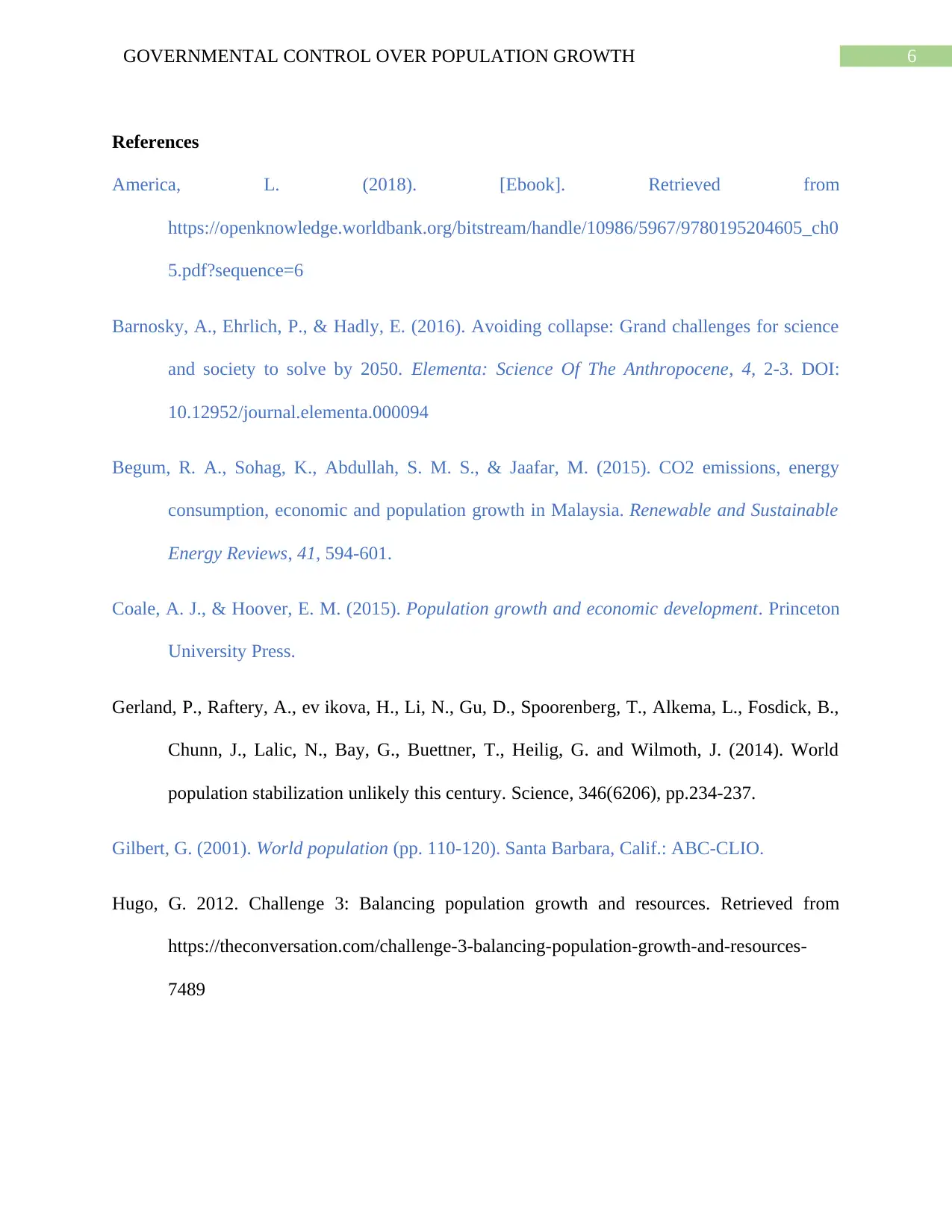
6GOVERNMENTAL CONTROL OVER POPULATION GROWTH
References
America, L. (2018). [Ebook]. Retrieved from
https://openknowledge.worldbank.org/bitstream/handle/10986/5967/9780195204605_ch0
5.pdf?sequence=6
Barnosky, A., Ehrlich, P., & Hadly, E. (2016). Avoiding collapse: Grand challenges for science
and society to solve by 2050. Elementa: Science Of The Anthropocene, 4, 2-3. DOI:
10.12952/journal.elementa.000094
Begum, R. A., Sohag, K., Abdullah, S. M. S., & Jaafar, M. (2015). CO2 emissions, energy
consumption, economic and population growth in Malaysia. Renewable and Sustainable
Energy Reviews, 41, 594-601.
Coale, A. J., & Hoover, E. M. (2015). Population growth and economic development. Princeton
University Press.
Gerland, P., Raftery, A., ev ikova, H., Li, N., Gu, D., Spoorenberg, T., Alkema, L., Fosdick, B.,
Chunn, J., Lalic, N., Bay, G., Buettner, T., Heilig, G. and Wilmoth, J. (2014). World
population stabilization unlikely this century. Science, 346(6206), pp.234-237.
Gilbert, G. (2001). World population (pp. 110-120). Santa Barbara, Calif.: ABC-CLIO.
Hugo, G. 2012. Challenge 3: Balancing population growth and resources. Retrieved from
https://theconversation.com/challenge-3-balancing-population-growth-and-resources-
7489
References
America, L. (2018). [Ebook]. Retrieved from
https://openknowledge.worldbank.org/bitstream/handle/10986/5967/9780195204605_ch0
5.pdf?sequence=6
Barnosky, A., Ehrlich, P., & Hadly, E. (2016). Avoiding collapse: Grand challenges for science
and society to solve by 2050. Elementa: Science Of The Anthropocene, 4, 2-3. DOI:
10.12952/journal.elementa.000094
Begum, R. A., Sohag, K., Abdullah, S. M. S., & Jaafar, M. (2015). CO2 emissions, energy
consumption, economic and population growth in Malaysia. Renewable and Sustainable
Energy Reviews, 41, 594-601.
Coale, A. J., & Hoover, E. M. (2015). Population growth and economic development. Princeton
University Press.
Gerland, P., Raftery, A., ev ikova, H., Li, N., Gu, D., Spoorenberg, T., Alkema, L., Fosdick, B.,
Chunn, J., Lalic, N., Bay, G., Buettner, T., Heilig, G. and Wilmoth, J. (2014). World
population stabilization unlikely this century. Science, 346(6206), pp.234-237.
Gilbert, G. (2001). World population (pp. 110-120). Santa Barbara, Calif.: ABC-CLIO.
Hugo, G. 2012. Challenge 3: Balancing population growth and resources. Retrieved from
https://theconversation.com/challenge-3-balancing-population-growth-and-resources-
7489
Paraphrase This Document
Need a fresh take? Get an instant paraphrase of this document with our AI Paraphraser
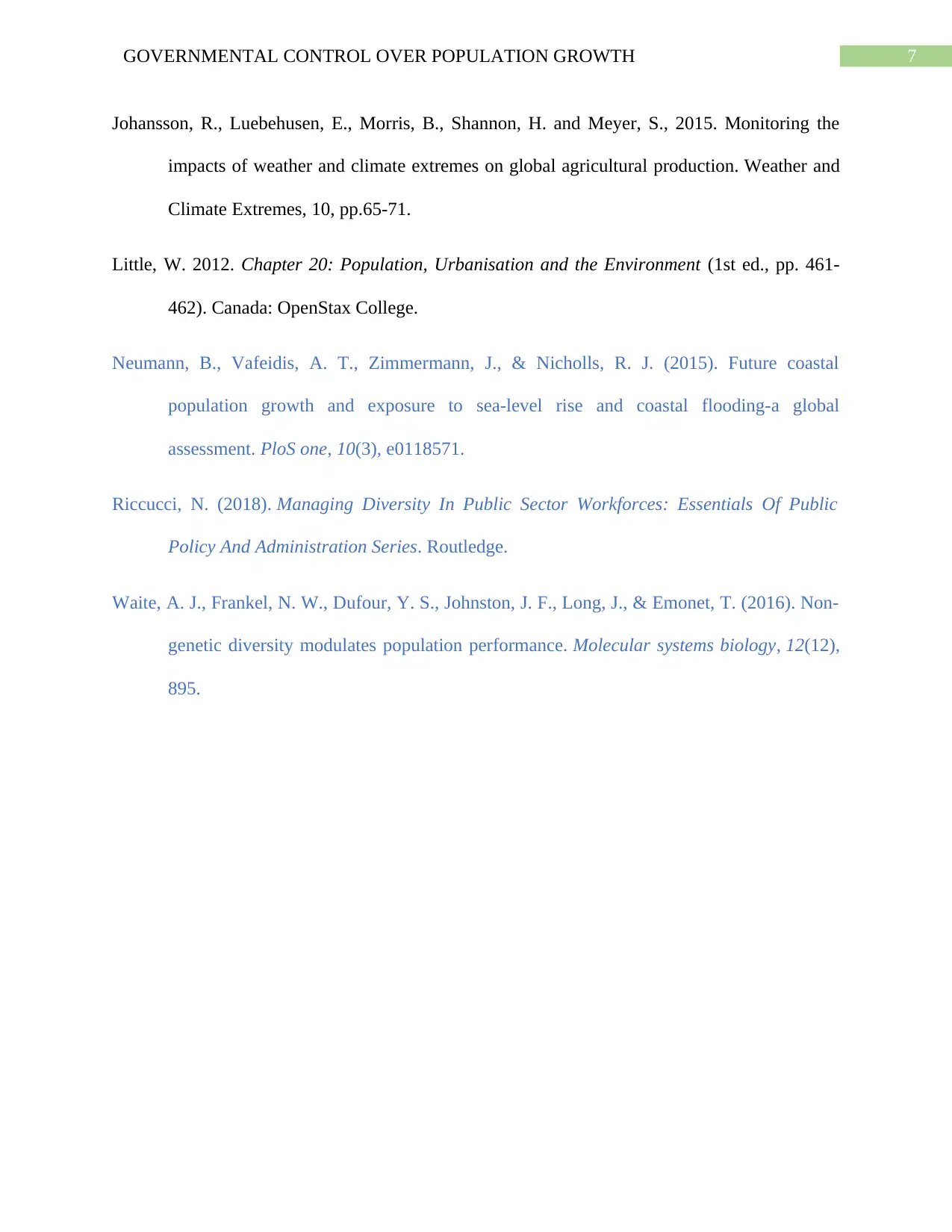
7GOVERNMENTAL CONTROL OVER POPULATION GROWTH
Johansson, R., Luebehusen, E., Morris, B., Shannon, H. and Meyer, S., 2015. Monitoring the
impacts of weather and climate extremes on global agricultural production. Weather and
Climate Extremes, 10, pp.65-71.
Little, W. 2012. Chapter 20: Population, Urbanisation and the Environment (1st ed., pp. 461-
462). Canada: OpenStax College.
Neumann, B., Vafeidis, A. T., Zimmermann, J., & Nicholls, R. J. (2015). Future coastal
population growth and exposure to sea-level rise and coastal flooding-a global
assessment. PloS one, 10(3), e0118571.
Riccucci, N. (2018). Managing Diversity In Public Sector Workforces: Essentials Of Public
Policy And Administration Series. Routledge.
Waite, A. J., Frankel, N. W., Dufour, Y. S., Johnston, J. F., Long, J., & Emonet, T. (2016). Non‐
genetic diversity modulates population performance. Molecular systems biology, 12(12),
895.
Johansson, R., Luebehusen, E., Morris, B., Shannon, H. and Meyer, S., 2015. Monitoring the
impacts of weather and climate extremes on global agricultural production. Weather and
Climate Extremes, 10, pp.65-71.
Little, W. 2012. Chapter 20: Population, Urbanisation and the Environment (1st ed., pp. 461-
462). Canada: OpenStax College.
Neumann, B., Vafeidis, A. T., Zimmermann, J., & Nicholls, R. J. (2015). Future coastal
population growth and exposure to sea-level rise and coastal flooding-a global
assessment. PloS one, 10(3), e0118571.
Riccucci, N. (2018). Managing Diversity In Public Sector Workforces: Essentials Of Public
Policy And Administration Series. Routledge.
Waite, A. J., Frankel, N. W., Dufour, Y. S., Johnston, J. F., Long, J., & Emonet, T. (2016). Non‐
genetic diversity modulates population performance. Molecular systems biology, 12(12),
895.
1 out of 8
Related Documents
Your All-in-One AI-Powered Toolkit for Academic Success.
+13062052269
info@desklib.com
Available 24*7 on WhatsApp / Email
![[object Object]](/_next/static/media/star-bottom.7253800d.svg)
Unlock your academic potential
© 2024 | Zucol Services PVT LTD | All rights reserved.





